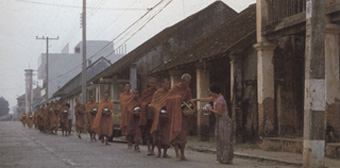|
|
|
The monkhood
|
The monkhood
Buddhist monks in Thailand are
highly venerated for their chaste life,
self-restraint, social benevolence and
knowledge of spiritual practice.
Thai Buddhist monkhood differs
from that of other religions in several
ways. Many monks are prominent in
simple, eloquent preaching, and also
write articles and books on their research
into Buddhist philosophy. Though a monk
is celibate and may not touch a woman,
even his mother, his life is not totally
cloistered. Meditating monks excepted,
daily contact with the laity is commonplace,
mostly during morning collections of alms
beyond the monastery precincts, and at
various ceremonies and festivals.
Monks abide by strict monastic discipline, observing 227 rules governing
their behavior. The breaking of the
four principal rules sexual relations,
theft, homicide or claiming superhuman
powers will result in immediate expulsion from the monastic order.

Early every morning, monks in Thailand
walk through the village to collect alms,
frequently in a row of hierarchical order.
During morning food collection the laity
not only acquires merit by donating
food, but also enjoys close contact with
the monks.
|
Unlike other monastic regimens,
Buddhist monkhood does not demand
regular manual labor of its monks. Physical
work is recognized as having value in
allaying destructive thoughts and desires.
However, the Buddhist monk, in order
to do away with inner defilement such
as greed, hatred and delusion, elects to
seek and destroy them through meditation which is of two kinds : meditation
for tranquillity and that for spiritual insight.
Freedom of discussion is allowed.
A Buddhist monk may question any part
of the Buddha's teaching. He may study
parts of the doctrine he feels important
to his advancement and choose his own
time to meditate. Except for the three
months of the annual Rains Retreat, he
is free to travel, a legacy from Buddhism's
earliest days when the Buddha and his
disciples led itinerant lives.
A monk may leave the monkhood
any time he wishes. The Thai ordination
is a public notice of a man's intention to
follow the Buddha's teaching. He is not
obliged to remain a monk for life, nor
does any stigma attach should he decide
to return to secular life.
Although Buddhism flourished during the
Ayutthaya period, historically little
is known of Ayutthayan Buddhism because of the near total destruction of the
Kingdom's records. The years following
1767 found Buddhism in disarray. The
situation improved when the first Chakri king, King Rama I, re-established religious
as well as social order.
A later Chakri king, King Mongkut
(Rama IV), founded a new Buddhist sect
during his monastic years. The Thammayutika sect, a basic reform of the existing
Mahanikaya sect, stressed stricter interpretation of monastic discipline, stipulated
changes in ordination procedures, and emphasized studying the original
Theravada scriptures in the ecclesiastic language of Pali.

After returning to the monastery, monks have their early morning meal.
The rest of the food will be eaten before noon.
|
Today, Theravada Buddhism is the
professed religion of over 90% of the Thai
people, and profoundly influences everyday life. It finds expression in the Thais'
tolerance and kindness toward their fellow
men, regardless of race, creed or nationality. It is visibly strengthened by the close
daily contact the laity enjoys with Buddhist monks during morning food
collections and casual meetings. People acquire 'merit' by donating food to the
monks; by building and renovating monasteries; by constructing hospitals; and
by showing kindness and compassion to
all living creatures. Such merit favorably
affects one's present as well as future rebirth.
All major Buddhist holy days are
national holidays. These include Magha
Puja (commemorating the miraculous
occasion when 1250 disciples aathered
spontaneously to hear the Buddha preach);
Visakha Puja (the holiest day in Thailand, marking the Buddha's birth,
enlightenment and death); Asalha Puja (commemorating the Buddha's first
sermon to his first five disciples); and Khao
Phansa (the commencement of the annual three-month Rains Retreat when all
monks stay inside their monasteries to study and meditate).
In Thailand, the Buddhist monks
play an important role in the rites and
celebrations of the people, such as birth,
marriage and funerals. The Thais invite
Buddhist monks to participate in all sorts
of ceremonies, to make them more auspicious. For some less happy ceremonies
such as funerals, the Thais consider that
the presence of Buddhist monks will
make it more propitious.

Besides preaching, monks often
voluntarily engage in communal
construction, developing closer contact
with villagers. Upper right: Although
Muslims are concentrated mainly in the
south, a mosque can also be found in
Phitsanulok in the central north. Below
right: A group of Muslims gather for a
religious ceremony.
|
One fundamental reason for the Thai
laity's generous support of the Sangha
(the Buddhist monastic order) is that
there are few Buddhist families in which
at least one member has not studied the
Buddha's teaching within monastic surroundings. Not uncommonly, a man,
after discharging his worldly duties and family obligations, will spend his
remaining years as a Buddhist monk.
It has likewise long been a Thai custom for Buddhist males over twenty to
be temporarily ordained as Buddhist
monks, generally during the annual Rains
Retreat. Government offices, certain
sections of the armed forces and larger
private companies make temporary ordinations easier by granting their
employees four months' leave with full salary.
Temporary ordination, ranging from
a few days to three months, is not the exclusive privilege of any one class. Everyone
from a farmer's son to royalty may take
this unique chance for self-improvement.
Both H.M. King Bhumibol Adulyadej
and his son, Thailand's Crown Prince,
H.R.H. Prince Maha Vajiralongkom, have been monks for short periods. Their acts
continue a tradition in which Buddhism unites all Buddhist members of society.
|
| | |
|
|